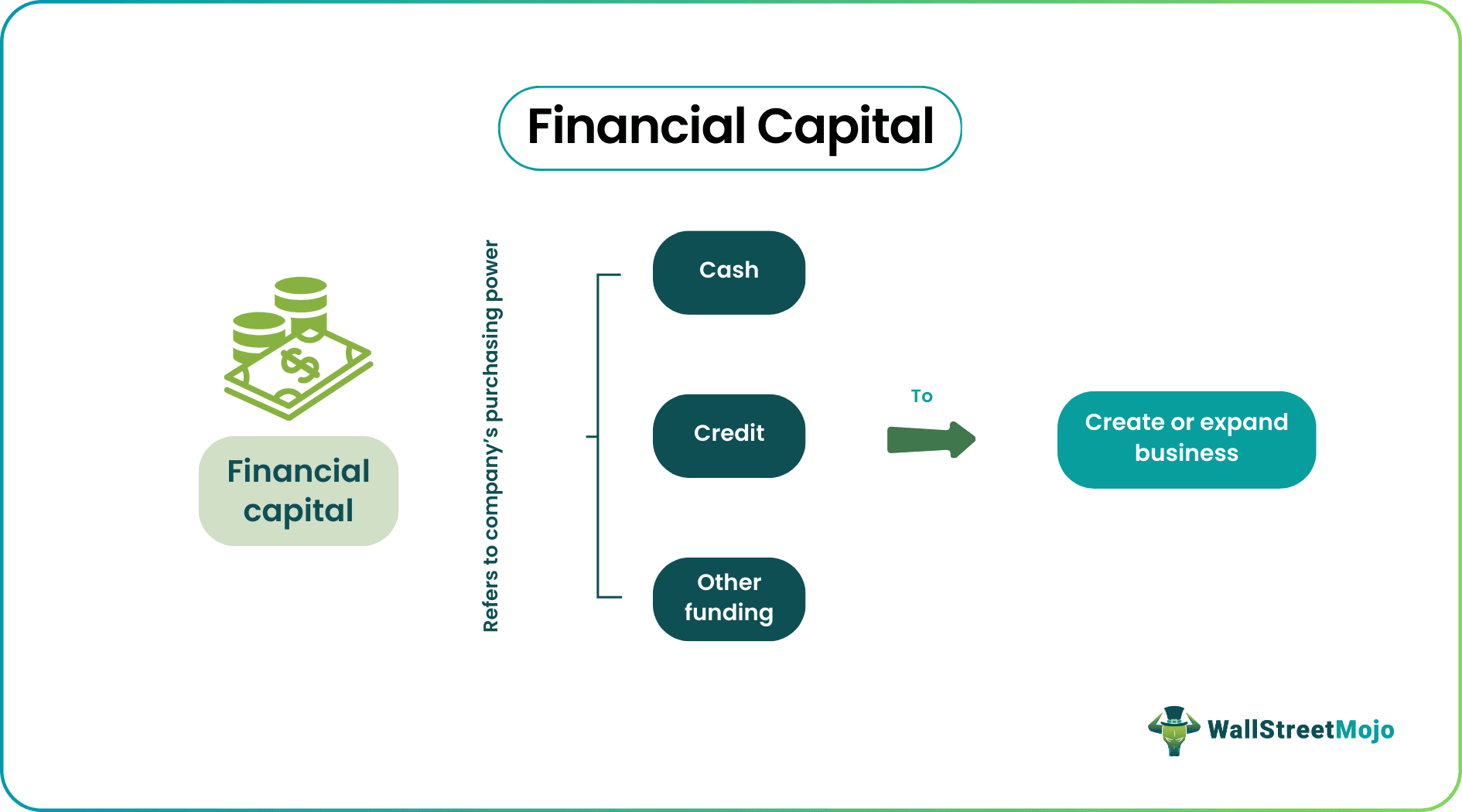Table Of Contents
What Is Financial Capital?
Financial capital refers to a company's purchasing power in cash, credit, or other funding. Corporations and individual entrepreneurs use it to invest in, create, or expand a business. Hence its purpose is to acquire or purchase the physical capital necessary for the production of goods and services.

To generate income and achieve capital profits, financial capital is required. It allows firms to exploit profitable investment possibilities without setting aside cash. It refers to a company's monetary resources. Financial Capital mainly comprises two sources, debt and equity; retained earnings, if any, are also a part of it.
Key Takeaways
- Financial capital refers to a company's cash, credit, or other funding purchasing power.
- Two principal sources of financial capital are debt and equity; retained earnings can also be considered a part of it.
- Debt constitutes borrowing from lenders, bank loans, or issuing bonds as securities. Equity comprises the owner's contribution, private equity market (venture capitalist), or stock exchange.
- Financial capital is the lifeblood of any business as it is used in buying fixed capital, physical capital, and daily operational expenses.
Financial Capital Explained
Financial capital implies the assets a business requires to deliver goods or services. It may include money, credit, and other types of finance that corporations use to generate wealth. It is a company's greatest asset and can make or break a company as it directly impacts its functioning. Debt and equity are the two most important forms of Financial Capital.
#1 - Debt
A debt is when a creditor (lender) lends a debtor (borrower) a specific quantity of assets. Implying that debt refers to any deferred payment for resources, whether monetary (loan) or goods or services (consumer credit). Lenders often extend funds with the expectation of repayment plus interest. Also, lenders have limited control over how a corporation is managed.
The legal instrument that creates the lender-borrower relationship has significant enforcement power. In extreme difficulties, especially when interest payments are missing, ownership and control revert to the creditors. Hence when a firm cannot pay back its creditors, it declares bankruptcy. As a result, the creditors may elect to seize the corporation and liquidate it as a form of recovery.
As a source of Financial Capital, firms can obtain debt through financial and non-financial sources. Financial sources include, among others, commercial banks, credit unions, and finance firms. In addition, financial sources include inter-enterprise credit between other businesses, informal marketplaces, and governments. Also, the company can raise debt by issuing corporate debt in the form of bonds.
#2 - Equity
Many firms resort to equity as a source of Financial Capital, besides debt. The capital market, also called the Financial Capital market, allows a firm to raise funds via securities trade.
The firm owner or co-owners generally contribute equity. It is gained in the form of investments or inheritance. In addition, investors who directly fund new assets (physical capital) typically get shares and voting rights as control measures.
However, various types of equity entitle different controlling power (e.g., voting versus non-voting stock, common stock vs. preferred stock, limited versus general partners). As profits rise, equity investors receive dividends, or the company maintains the gains and reinvests them in physical capital. This enhances the equity value and the value of capital per owner.
The equity financing reflects the company's potential for growth. Investors show interest in getting a piece of ownership as equity if they see potential in the firm. Generally, businesses acquire stock for their development from wealthy family members, friends, and acquaintances on the angel market. This occurs after the primary proprietors and start-up team have supplied the initial equity.
Venture capital is an additional equity source that provides intermediated funding on more established markets than angel financing platforms, often known as the Private equity market. Once they have expanded substantially, firms can get equity by issuing shares on the stock exchange.
Example
Let us look at the example of Umbrella Corporation's Financial Capital constitution to understand the concept better.
Umbrella Corporation is in the business of manufacturing medicines to prevent genetic defects. However, when it began, it lacked the financial resources for the required investment. So the owners contributed amount X and utilized 50% for infrastructure development and renovation building. The balance was used to purchase machinery and equipment.
To begin the research and development of the drug, they were still in need of funding. So, they borrowed 20% of the required amount from relatives and acquaintances. Then, added another 20% by financing through a commercial bank. Finally, it obtained 60% of the funds to get the balance by selling securities on the capital market.
Looking at the financial capital example, it is understood that Umbrella corporation secured Financial Capital through various means. For instance, it included owners' contributions, acquaintances' credit, bank loans, and capital market funding.
Importance of Financial Capital
It would be an understatement to say that Financial Capital is the oxygen for any business. The following points summarize the requirement and, thereby, its importance:
- To buy fixed capital, those not consumed in production, like land and building.
- To buy physical capital, those get consumed or depreciated during production like equipment, inventory, and the like.
- For developing a concept or prototype to sell it to the people.
- To maintain and manage day-to-day business operations.
- To invest in human resources, skilled and unskilled.
- Invest in opportunities if the firm operates in such a service industry.
- To infuse funds to expand into new markets or develop new products within an existing market.
